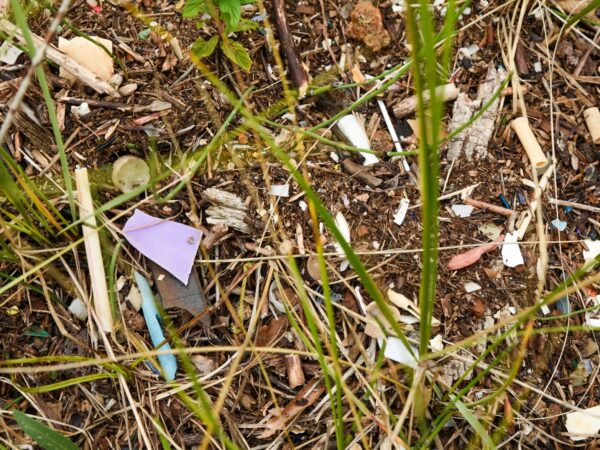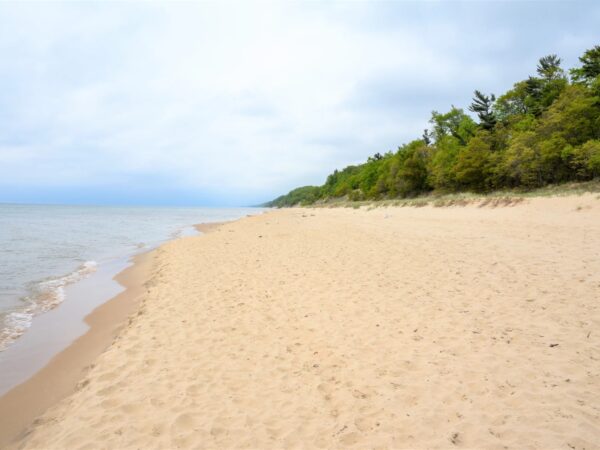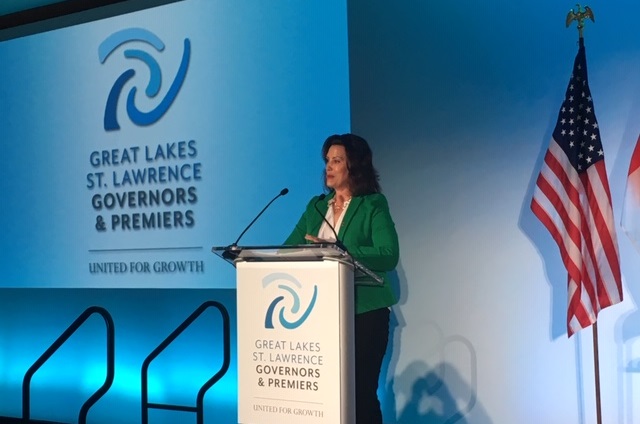
As Michigan Gov. Gretchen Whitmer’s first year in office wound to a close, two environmental organizations called for her to pick up the pace on protecting the Great Lakes in 2020.
In that first year, Whitmer fought protracted political battles with the legislature over “fixing the damn roads”—her signature campaign promise—and negotiating a budget.
As the roads and budget battles played out, environmental groups wanting action on her Great Lakes campaign promises sat quietly on the sidelines.
But standing idly by for those groups is over as 2020 begins.
Calling for action from the governor
In December 2019, Chicago’s Environmental Law and Policy Center called on Whitmer in a public letter to lead Great Lakes governors and Canadian premiers in the fight to curb agricultural pollution that leads to algae blooms in Lake Erie.
Saying Ohio “needs a push,” the group wrote that Michigan and Ontario also bear responsibility for Lake Erie’s problems. Whitmer should “lead in accelerating coordinated actions by her fellow leaders to clean up Lake Erie,” ELPC Executive Director Howard Learner wrote.
Also in December, the Michigan environmental group For Love of Water, in a letter obtained by Great Lakes Now, called on Whitmer to lead the region in strengthening the Great Lakes Compact.
The compact is the eight-state agreement designed to prevent diversions of water outside the Great Lakes basin. In Canada, Ontario and Quebec have a similar agreement.
Noting that Whitmer was recently elected chair of the governors and premiers group known as the Compact Council, FLOW said her “leadership gives Michigan, the Great Lakes state, the opportunity to further strengthen protections of the world’s largest freshwater ecosystem.”
Specifically, FLOW wants Whitmer to lead on closing the bottled water loophole in the compact that defines water in containers less than 5.7 gallons as a product, therefore exposing it to increased risk of diversions.
In a June 2019 meeting of the Compact Council in Milwaukee, Whitmer told Great Lakes Now that “Michigan has to lead on Great Lakes issues.”
The Compact vs. bottled water legislation
Separate from leading the Great Lakes region, Whitmer faces significant conservation issues in Michigan.
In her 2018 election campaign she said “we need a way to control the siphoning of water for water bottling and my administration will work to see it done.”

Bottled Water, Photo by Steven Depolo via flickr.com cc 2.0
A contested case before an administrative law judge will determine if Nestle can increase withdrawals of water for bottled water. The increased withdrawal was approved by the previous administration even though over 80,000 people expressed opposition to it in public comments.
The director of the Department of Environment, Great Lakes and Energy will make the final decision after the law judge rules. The law judge’s decision is expected in early 2020.
Fellow Democrats in the legislature raised the bar for Whitmer recently when they introduced legislation to prevent shipments of bottled water from Michigan out of the Great Lakes basin.
The Great Lakes Compact permits those shipments but allows individual states to prohibit them.
For the legislation to pass, it will need support from the same Republican majority in the legislature who in 2019 pushed back on her road funding and budget priorities.
Whitmer’s office did not respond to a request for comment on whether she would actively work to pass the legislation.
She also declined to comment on the Nestle contested case and referred questions about the Great Lakes Compact to EGLE.
EGLE did not respond to requests for comment.
Old business and a new threat
Resolution of the Enbridge Line 5 oil pipeline remains an open issue. Negotiations broke down between Michigan and Enbridge on a pipeline in a tunnel under the Straits of Mackinac to replace the existing Line 5. The issue has entered a legal phase.
Enbridge won round one when a law judge ruled that the tunnel agreement did not violate Michigan’s constitution as the state claimed. In a release announcing that Michigan would appeal the decision, Attorney General Dana Nessel said Michigan “will not rely on a foreign corporation” to protect the Great Lakes. Enbridge is based in Canada.
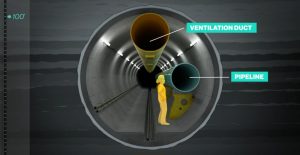
Line 5 Straits crossing Alternative Pipeline, Image by enbridge.com
A broader case on the legality of the existing pipeline is pending and a decision is expected early in 2020.
“Governor Whitmer remains committed to a solution that protects the Great Lakes, removes the pipelines from the Straits as soon as possible and provides for the Upper Peninsula’s energy needs,” spokesperson Chelsea Lewis said in an email.
In June 2018, Whitmer said in a Great Lakes Now interview that protracted litigation without making progress on a tunnel was the “worst-case scenario.”
Last year, Whitmer created the UP Energy Task Force to assess the UP’s overall energy needs and how those are being met, and come up with alternatives. The task force has to submit an alternative propane plan to Whitmer by March 31, 2020.
Whitmer is balancing her Line 5 position between groups that have supported her politically. Environmental groups have lobbied for a Line 5 shutdown since 2013. Unions strongly support the tunnel plan and the jobs it would bring.
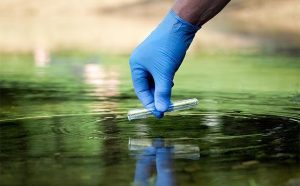
PFAS water sample from theBelmont and Rockford areas, Photo by wgvunews.org
Michigan is also dealing with PFAS, implementation of Michigan’s new Lead and Copper Rule designed to prevent another Flint water crisis and rising lake levels.
And now comes the “green ooze” – hexavalent chromium – that was discovered leaking onto a major Michigan highway. It came from a chemical plant that was shut down in 2016.
Responsibility for the cleanup and prevention of a recurrence rests with Michigan’s EGLE and the U.S. Environmental Protection Agency.
Those agencies shared responsibility for the Flint water crisis, so this will be a test of the reorganized Michigan agency’s ability to react to an emergency.
Whitmer has ordered the agency to conduct a review of its pollution inspection procedures for dealing with environmental emergencies.
Looking forward
Whitmer has identified shoreline erosion, chemical contamination, failing infrastructure, algal blooms and Asian carp as “pressing threats,” according to spokesperson Lewis.
“We cannot sit back and wait while these problems to get worse. The ecological, economic and health risks are too high,” Lewis said.
Citing her schedule, Whitmer’s office declined a Great Lakes Now interview request on her 2020 Great Lakes and environmental agenda.
Whitmer will host a meeting of Great Lakes governors and Canadian premiers in Grand Rapids in June.
Featured Image: Michigan Gov. Gretchen Whitmer speaking at the The Great Lakes and St. Lawrence Governors and Premiers 2019 Leadership Summit in Milwaukee, Wisconsin, Photo by Gary Wilson
1 Comment
-
Please address the water contamination issues!



